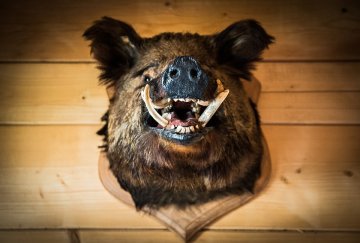I Trophy Hunt

Trophy hunting is legal sport all around the world and is very popular in the dangerous game hunting. Hunters around the world pay thousands of dollars for getting permits to hunt in the wild. The trophies acquired are priceless possessions for the hunters. Hunting wldlife such as lion, bear, elephant, rhino, boar, buffalo, leopard, and so on are common for trophies.
Buck, fish, deer, wild goat, giraffe, zebra, elk, moose, bobcat, ox, bull, and so on are also favorites for trophy hunters. Passionate hunters travel during hunting season for the trophies.

Licensed outfitters arrange for the wildlife hunting for trophies. Canned hunting is also famous for breeding wildlife for hunting. Trophy hunters' primary goal is to secure the heads, hides, skin, tusks, horns, antlers, teeth, and so on of the game. The parts are cleaned and processed with chemicals for long term storage and display.
Hunting exotic mammals for trophies is a great sport for hunters. Rifles, crossbow, muzzleloader, and so on are used for trophy hunting. Sophisticated equipment and gear faciliate the trophy hunting.
If we observe the Trophy hunting facts, we can learn that the controlled and regulated activity is legal in most parts of the world. Although it looks controversial, approprite permits and licenses are available for trophy hunting. Huge revenue is generated from the trophy hunting fees which in turn is used for the conservation of wildlife and natural resources.
Special trophy hunting packages are available in Africa, Kenya, Nairobi, and so on for international hunters. Different methods such as the Safari Club International (SCI) and Rowland Ward method are used for measuring the trophies.

Several case studies in trophy hunting have proved that the hunting is actually beneficial for the economy and the wildlife. For example, rhinos in South Africa and Namibia, Argali in Mongolia, Bighorn sheep in the North America, and so on have resulted in heavy fees from trophy hunting. Wildlife lands and communities are being developed and regulated in Zimbabwe and Africa to facilitate trophy hunting.
The trophies are secured and the meat may be saved or discarded in trophy hunting. Hunters pay hefty fees and charges for big game trophy hunting.
Here are some of the advantages of trophy hunting.
Environment lovers hate trophy hunting due to the killing of the wild animals for sport. Many organizations have requested for banning trophy hunting. Especially, canned hunting is perceived as the most damaging because the animals are raised for hunting and do not possess the real tactics for running or escaping hunters. This is a disadvantage for the wildlife as they lack the skills which other naturally raised wildlife would have.
Trophy hunting is also seemed unethical because the animal is killed and the parts are exported without any regard for the hunt. Improper discarding of waste is a big problem in trophy hunting.
Here are some other disadvantages of trophy hunting:
Over hunting for the trophies can result in damaging the natural eco system and elimination of species.

Trophy hunting can be a pleasant experience if the hunters are prepared ahead. Planning is crucial for successful trophy hunting season. Here are some tips for trophy hunting.
